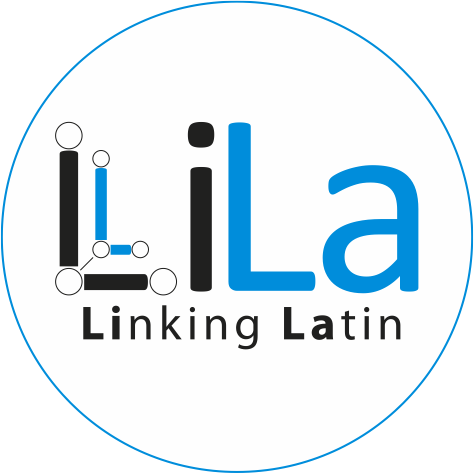EADH 2021 tutorial
Interlinking through Lemmas. Linking Linguistic Resources to a lexically-based LLOD Knowledge Base
2nd International Conference of the European Association for Digital Humanities
This half-day tutorial will be held during the 2nd International Conference of the European Association for Digital Humanities (EADH2021).
Date and time of the activity
Tuesday, 21/Sept/2021, 2:00 pm – 6pm (Krasnoyarsk time, GMT+7 / CEST +5)
Location
Krasnoyarsk, Russia or online.
Description
The tutorial aims to introduce the architecture, use and enhancement of the LiLa Knowledge Base of interlinked linguistic resources for Latin, developed in the context of the LiLa: Linking Latin project. In particular, the tutorial will present how the Linked-Data model adopted by LiLa is used to connect distributed lexical and textual resources, to ensure their interoperability. We show how, via lemmatisation, texts become part of this network of resources. We provide participants with a theoretical introduction to the architecture of LiLa, as well as hands-on support in their interaction with the LiLa Knowledge Base.
The proposed tutorial falls within the field of Linguistic Linked Open Data (LLOD). While we focus on Latin, the methods discussed are language independent and thus have a much wider application, proving useful for similar initiatives on other languages.
Starting from the experience of LiLa, we introduce the audience to some of the most relevant topics in current digital textual studies and linguistic resources, including:
-
Language (Meta)data. Tools and techniques of linguistic annotation. Specific concepts and technologies discussed: tokenisation, part-of-speech tagging, lemmatisation, and application of a Natural Language Processing (NLP) pipeline with specific models trained on a large Latin corpus.
-
Knowledge Graphs. Tools and techniques to interoperably link linguistically-annotated datasets. Specific concepts and technologies discussed: interoperability standards, ontologies, RDF, SPARQL, Linguistic Linked Data.
-
Use Cases in Language, Data and Knowledge. Possible uses for philology and linguistics, namely searches combining etymology, polarity, frequency, (graphical) variation, meaning, and more.
Target audience
This tutorial is intended for those who wish to explore solutions to publish texts using LOD. Although we focus on our experience with Latin, we welcome any participant interested in the theme of textual resources and LOD; prior knowledge of Latin and/or LOD is not required.
Materials and technical requirements
The text and tools necessary to participate in the event will be provided by the LiLa team before and during the tutorial. The tutorial is designed to work with desktop computers and laptops, *not* tablets or smartphones.
Programme
The activity will consist of two parts. Part 1. Theory: Presentation of the structure of the LiLa Knowledge Base. Part 2. Practice: Preparing and linking a Latin text to LiLa.
On Twitter, look for the hashtag #eadh2021 and/or the handle @ERC_LiLa to follow updates from this tutorial.
Registration
Participants are required to register to the conference: https://eadh2020-2021.org/registration/
